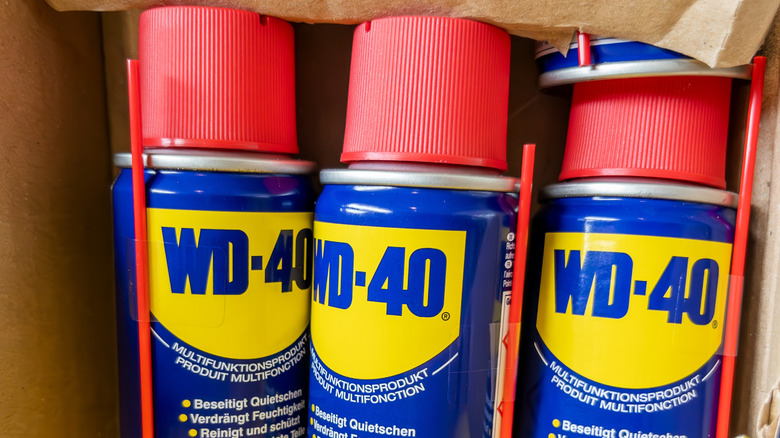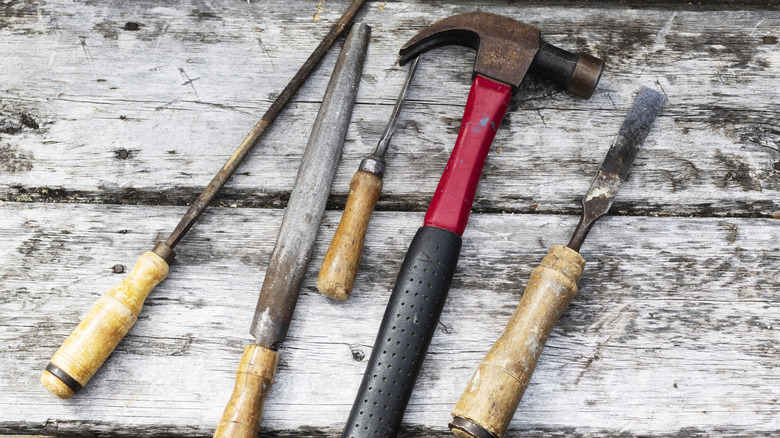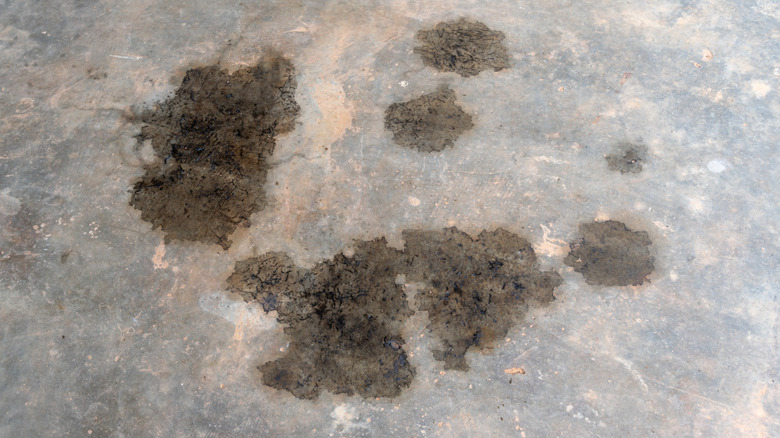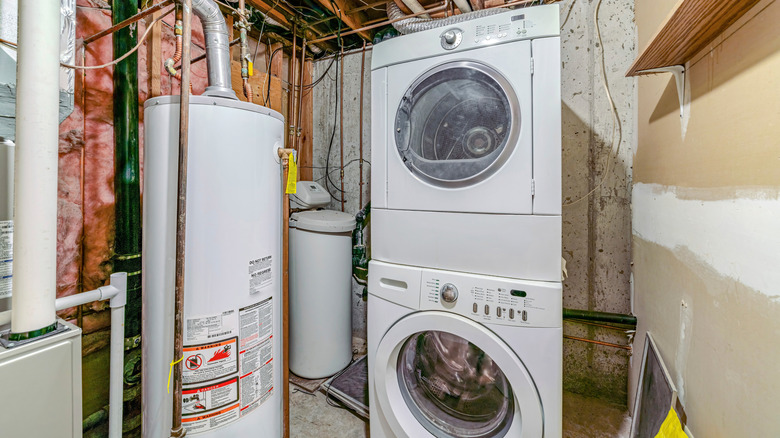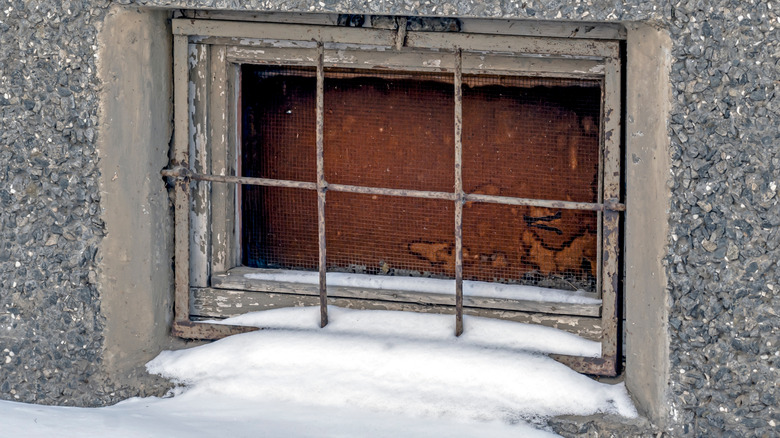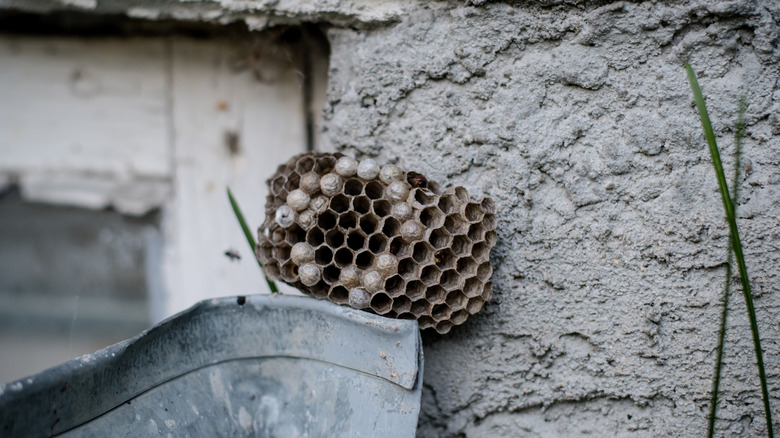5 Unexpected Ways You Could Be Using WD-40 In Your Basement
We may receive a commission on purchases made from links.
There are so many genius ways to use WD-40 in your home that's beyond just solving a squeaky door hinge. In truth, the household item is a multi-use product that has some sneaky, but incredibly convenient purposes, ranging from maintaining cars to sustaining sports equipment. Originally a water displacement product invented in 1953, WD-40 (which is an acronym for "water displacement, 40th formula") has evolved to become a universally beloved material, great for protecting or lubricating household surfaces in any room imaginable.
There are brilliant ways to use WD-40 in your garage, but an unexpected place to use WD-40 is, in fact, your basement. While there are definitely similarities to using this spray in your basement as there are in your garage, or other high-trafficked areas in the home meant for utilitarian work, there are some key ways to use the spray that makes so much sense for subterranean spaces. From tool maintenance to cleaning ideas, and with a basement's multi-use nature in mind, here are some of the best, unexpected ways you can utilize WD-40 in those spaces that will help keep your basement not-so-squeaky, but oh so clean.
Protect and maintain your tools in basement storage
In the absence of a shed or garage, it's logical to store your tools in the basement. And to give those stored-away tools a little extra life, use WD-40 to protect and maintain them. For your metal tools, in particular, WD-40 can stop rust from building on the metal's surface; spray a layer on saws, shovels, trowels, and rakes as a preventative measure against corrosion. You can also coat the hinges and springs of your tools with a little extra WD-40 to keep them lubricated and functional too.
For tools with wooden components, WD-40 can also help prevent wood splintering and splitting, particularly wooden handles. Split or cracked wood may make hands prone to splinters when you're carrying the tools, so it's in everyone's best interest to try to prevent that. Spray generous amounts of WD-40 onto the handles and rub it into the surface of the wood to prevent the wood from drying out. Sealing it in such a way helps stop any cracking and splitting. With these tips, your tools will live a much longer life when stored in your basement. Just remember, for this trick and others, be sure to wear a mask when spraying, particularly if your basement doesn't have the most efficient ventilation.
Keep basement floors spot free
WD-40 can help clean or maintain a whole slew of different flooring materials, so whether you have concrete floors in an unfinished basement or carpeted ones in a fully-converted basement family room, WD-40 may just be your saving grace when it comes to stains. If you experience an oily or greasy spill on concrete floors, spray the WD-40 on to the stained area, and let it sit for two minutes. After which, scrub at the sprayed stain with a broom or brush with stiff bristles. Finally, spray the affected area with water, and dry the floor.
For stains on carpets, similarly spray the WD-40 on the stain and wait a minute or so before using your normal carpet cleaner. Alternatively, you can also rinse the spray with warm soapy water and work it out with a sponge until the stain disappears. WD-40 can also be a cleaning hack on tile floors too. Simply spray any scuffed tiles with it, and wipe the marks with a microfiber towel. The scuffs should fade, and your floors will be spotless, once again. Of course, this hack isn't exclusive to basements, but WD-40 is uniquely universal when it comes to cleaning stains out of the flooring that basements usually have.
Clean machinery with WD-40
If a laundry machine is located in the basement it can be vulnerable to grime and rust build up. In an unfinished basement this might typically occur around the sides and at the back of the machine, but in general, as basements can be prone to moisture, which is only exacerbated by the presence of your humidity-producing washing machine and dryer, there's a greater chance of machines experiencing corrosion of some sort. If you don't maintain a moisture-free environment, and don't keep an eye out for or treat suspected corrosion and grime, eventually, the humidity and moisture can degrade your machine's components.
If this is the case, consider using WD-40 to clean your machines up. One of WD-40's most popular uses is to treat and protect metal surfaces, meaning it's a great way to clean machinery and also to prevent rust and corrosion. If it's been a long while since you've tackled your laundry's machinery clean up, there is an even hardier, specialist WD-40 degreaser formula to help penetrate stubborn build up. It features foaming ingredients that help break down dirt, grime, and rust, particularly on machinery. The product boasts a contamination-free formula, making it safe to use on appliances, and the ideal tool to make sure your washing machine keeps going for years on end.
Protect your basement windows from snow build up
Out of all the rooms in your home, basements are particularly susceptible to moisture and humidity, due to its subterranean location, where it's surrounded by damp, dirt, and soil. Warmer, more humid air, is also attracted to the ever-cooler temperatures in the basement as well, so when that warm air travels downward and meets the cooler environment, it's possible that water droplets, and therefore moisture, materializes in your basement. With all that said, there's actually several ways water can make its way down to these spaces, from pipe issues to vulnerable foundations.
Therefore, it's a great idea to try to prevent any unwanted moisture from coming into the basement in whatever way you can. A big winter time moisture culprit is snow build up on basement windows or exterior entrances. However, WD-40 can help get rid of that potential source of excess water, taking care of at least one problematic way moisture gets into the basement. Simply spray the outside of your windows before the snow begins falling, and the snow won't stick and build up on the glass or metal frames. This trick also works on snow shovels to prevent snow from sticking and building up on your tools.
Fend off unwanted insects
There are some types of insects out there that absolutely thrive in basement environments, because they love dark and damp spaces. Some of these pests, like termites, can create big problems when they infest homes, while others like sowbugs and millipedes are just extremely unsavory visitors. Due to a basement's proximity to surrounding soil and dirt, these unwanted crawlers can easily make their way inside your home, but a spray of WD-40 can help prevent some bugs from making it successfully inside.
Spray your basement windows and exterior doors with a layer of WD-40 to create a barrier against any entering bugs. The water displacement formula acts as a repellent, ultimately warding off those creepy crawlies for a while. Some home enthusiasts also believe that, in a pinch, WD-40 is an instant killer for cockroaches in the house. Others believe that WD-40 can also prevent wasps and bees from making nests in your walls or right outside your basement windows.
